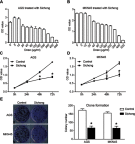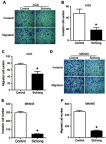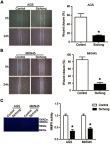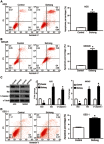Sichong formula inhibits the proliferation and migration of human gastric cancer cells
- PMID: 31410020
- PMCID: PMC6643054
- DOI: 10.2147/OTT.S199605
Sichong formula inhibits the proliferation and migration of human gastric cancer cells
Abstract
Purpose: Traditional Chinese medicine (TCM) has gained increasing attention for the treatment of multiple chronic diseases, such as cancer. Here we aim to identify the antitumor activity of Sichong formula, a novel TCM, in human gastric cancer cells and investigate the underlying mechanisms.
Methods: The AGS and MKN45 gastric cancer cells were treated with Sichong formula at different concentrations. The proliferation rates were tested by CCK-8 and colony formation assays. Cell migration and invasion were tested by scratch and transwell assays. Gelatin zymography was used to detect the matrix metalloproteinase 9 (MMP9) activity in cell suspendents. Cell apoptosis was analyzed by Annexin V/PI staining and flow cytometry. The expression of interest proteins was tested by Western blot.
Results: Cell proliferation analysis indicated that Sichong formula inhibited cell viability of AGS and MKN45 cells in a dose- and time-dependent manner. The IC50 values were 240 μg/mL and 200 μg/mL for AGS and MKN45 cells, respectively. Furthermore, we found that Sichong formula could inhibit the invasion and migration of gastric cancer cells, which might be mediated by the downregulation of MMP9 activity. Flow cytometry results indicated that Sichong formula induced apoptosis in gastric cancer cells through upregulation of Bax/Bcl2 ratio and activation of caspase cascade. The results from Western blot indicated that Sichong formula resulted in cell autophagy and inactivation of AKT signaling pathway.
Conclusion: Our data suggest that Sichong formula inhibits the proliferation and migration and induces apoptosis in human gastric cancer cells. The inhibitory effect of Sichong formula was, at least partly, mediated by cell autophagy and AKT pathway.
Keywords: MMP9; apoptosis; invasion; migration.
Conflict of interest statement
The authors report no conflicts of interest in this work.
Figures





Similar articles
-
The ubiquitin ligase CHIP modulates cellular behaviors of gastric cancer cells by regulating TRAF2.Cancer Cell Int. 2019 May 16;19:132. doi: 10.1186/s12935-019-0832-z. eCollection 2019. Cancer Cell Int. 2019. PMID: 31130821 Free PMC article.
-
Knockdown of RAI14 suppresses the progression of gastric cancer.Onco Targets Ther. 2018 Oct 9;11:6693-6703. doi: 10.2147/OTT.S175502. eCollection 2018. Onco Targets Ther. 2018. PMID: 30349303 Free PMC article.
-
[Curcumin inhibits proliferation,migration and invasion of gastric cancer cells via Wnt3a/β-catenin/EMT signaling pathway].Zhongguo Zhong Yao Za Zhi. 2019 Jul;44(14):3107-3115. doi: 10.19540/j.cnki.cjcmm.20190304.002. Zhongguo Zhong Yao Za Zhi. 2019. PMID: 31602860 Chinese.
-
Antiproliferative activity of plumbagin (5-hydroxy-2-methyl-1,4-naphthoquinone) in human gastric carcinoma cells is facilitated via activation of autophagic pathway, mitochondrial-mediated programmed cell death and inhibition of cell migration and invasion.J BUON. 2019 Sep-Oct;24(5):2000-2005. J BUON. 2019. PMID: 31786867
-
[Effects of dihydromyricetin on the migration and invasion of human gastric cancer MKN45 cells and its mechanism].Zhongguo Ying Yong Sheng Li Xue Za Zhi. 2019 Sep;35(5):428-432. doi: 10.12047/j.cjap.5809.2019.093. Zhongguo Ying Yong Sheng Li Xue Za Zhi. 2019. PMID: 31894675 Chinese.
Cited by
-
Hsa_circ_0003159 inhibits gastric cancer progression by regulating miR-223-3p/NDRG1 axis.Cancer Cell Int. 2020 Feb 19;20:57. doi: 10.1186/s12935-020-1119-0. eCollection 2020. Cancer Cell Int. 2020. PMID: 32099530 Free PMC article.
-
Efficacy and safety of Kanglaite injection for gastric cancer: A protocol for systematic review and meta-analysis.Medicine (Baltimore). 2020 Aug 7;99(32):e21619. doi: 10.1097/MD.0000000000021619. Medicine (Baltimore). 2020. PMID: 32769923 Free PMC article.
-
Immunomodulatory potential of Clinacanthus nutans extracts in the co-culture of triple-negative breast cancer cells, MDA-MB-231, and THP-1 macrophages.PLoS One. 2021 Aug 11;16(8):e0256012. doi: 10.1371/journal.pone.0256012. eCollection 2021. PLoS One. 2021. PMID: 34379689 Free PMC article.
-
miR-31 Modulates Liver Cancer HepG2 Cell Apoptosis and Invasion via ROCK1/F-Actin Pathways.Onco Targets Ther. 2020 Jan 29;13:877-888. doi: 10.2147/OTT.S227467. eCollection 2020. Onco Targets Ther. 2020. Retraction in: Onco Targets Ther. 2024 Apr 06;17:305-306. doi: 10.2147/OTT.S472230. PMID: 32099392 Free PMC article. Retracted.
References
-
- Sarbia M, Becker KF, Höfler H. Epidemiology of upper gastrointestinal malignancies. Semin Oncol. 2004;31(4):450–464. - PubMed
LinkOut - more resources
Full Text Sources
Research Materials
Miscellaneous

